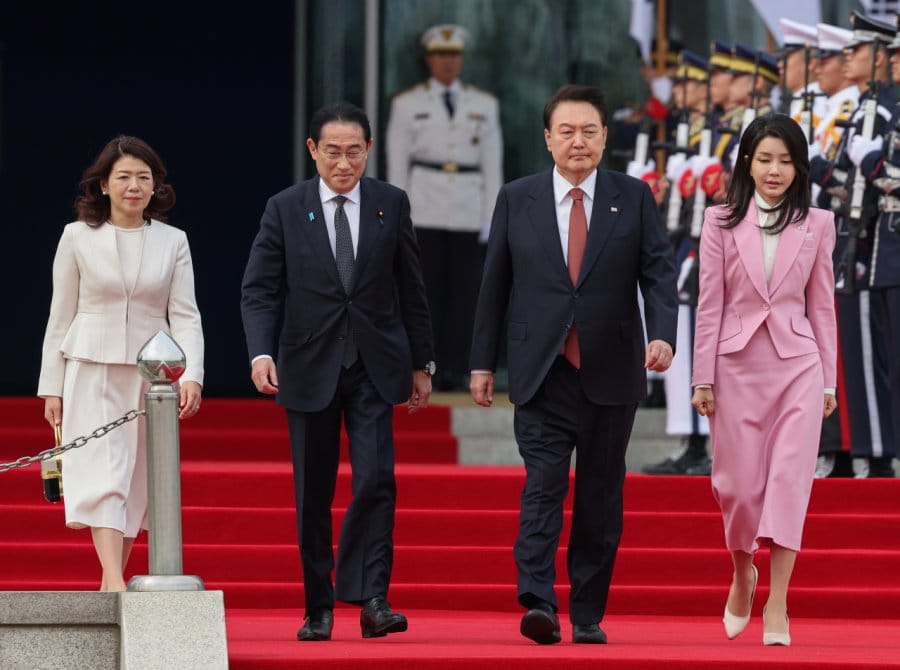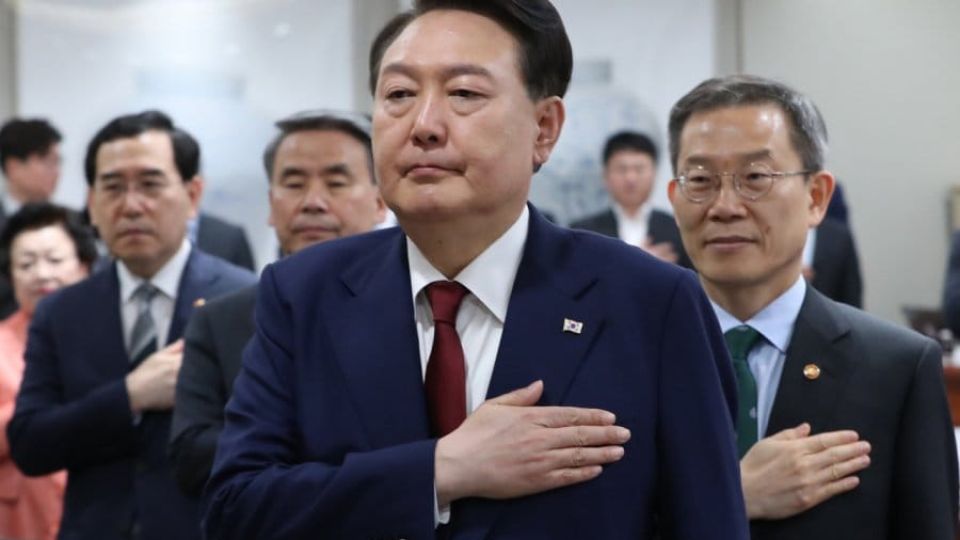May 10, 2023
SEOUL – On Tuesday, South Korean President Yoon Suk Yeol completed his first year in office, receiving mixed reviews for his initiatives in foreign affairs and criticism for his handling of domestic affairs, which have at times starkly divided the public.
Yoon’s performance as Korea’s leader has been closely watched, with supporters praising him — the former prosecutor general and a political novice, for what they see as his efforts to improve diplomatic relations — and opponents criticizing what they perceive as his shortcomings in domestic leadership.
Experts and political observers here say that he made notable progress in diplomacy by making efforts to strengthen the trilateral relationship once again with the aim of effectively deterring North Korea’s evolving threats and other challenges the region is facing over rising tensions with China and Russia. At home, however, he has suffered from low popularity for the last 12 months, making it difficult for him and his party to push ahead with policies he promised during the presidential campaign.
Strengthening diplomatic relations with the US and Japan is his biggest achievement in his first year in office, according to Choi Jin, head of the Institute for Presidential Leadership in Seoul, who stressed Yoon has contributed to tilting the scales of South Korean diplomacy — which had pursued direct dialogue with North Korea under the previous liberal Moon Jae-in administration — back in a conservative direction.
“A diplomatic balance needed to be struck through a right-leaning approach, especially since the previous administration was very left-leaning,” he said.
“Despite facing some controversies, forging the stronger alliance with the two countries is essential for South Korea’s security and stability, and moving in the right direction in the changing global landscape,” Choi said.
Shin Yul, a political science professor at Myongji University, commented that Yoon has proved his ability to cope with the changing international order and pushed ahead with a clear diplomatic approach to forge close ties with the United States and Japan, saying that what Yoon has done was not a matter of choice.
During his state visit to Washington earlier this month, Yoon and his US counterpart, President Joe Biden, adopted the Washington Declaration, which states the two countries’ agreement to launch a Nuclear Consultation Group that guarantees Seoul’s participation in the US’ extended deterrence commitments to Korea.

A week later, Yoon held a summit with Japanese Prime Minister Fumio Kishida, where they confirmed bilateral ties have been brought back on track after years of strained relations over historical disputes. Although Kishida did not give an official apology as many Koreans had hoped for, he expressed his personal remorse over what people went through during the Japanese colonial era. The three nations have moved closer to trilateral security cooperation against increased threats from North Korea and China.
Touting such achievements, Yoon said, “No field has undergone a bigger transformation than foreign affairs and national security.”
However, some experts, including Kim Joon-hyung, a professor of politics in the School of International Studies, Languages and Literature at Handong Global University, have expressed concerns that Yoon’s diplomacy may be too narrowly focused on the US and Japan. According to Kim, Yoon’s worldview is rooted in the values of freedom and democracy, and this may lead him to view countries as either friends or foes.
Chun Chae-sung, a professor in Seoul National University’s department of political science and international relations, also said that while the alliance between South Korea and the US is important, it is crucial for Seoul not to prioritize it excessively. Chun argued that South Korea also has significant interests in its relations with China and Russia, as they are traditional economic partners and important for addressing North Korean issues.
On the economic front, Yoon has been very active in promoting Korean businesses whenever he travels overseas, often referring to himself as the country’s “No. 1 salesman.” He has been accompanied by leaders from some of South Korea’s top conglomerates, and many companies have high hopes for Yoon’s business-friendly moves and policies.
Joo Won, director of the Hyundai Research Institute, believes that Yoon’s efforts to boost the vitality of companies through business-friendly policies are positive and will contribute to growth for South Korea.

However, despite Yoon’s efforts in promoting Korean businesses overseas, he has had little effect on the domestic economy.
According to a survey released on Tuesday by Yonhap News Agency, nearly 40 percent of respondents said he should focus on measures to revitalize the economy and create jobs for the future of the country, while 18.7 percent said social conflict resolution and national integration should be his priorities. Some 14 percent said he should engage more in communication with the public.
“His first, second and third priorities should be addressing the cost of living crisis,” Choi Jin said, noting, “But he has not taken any steps towards that.”
Choi believes that Yoon needs to spend more time with ordinary local people to hear their concerns.
“Yoon should visit factories, markets and other places where ordinary people work and shop, as well as meet with people suffering from social problems like school and sexual violence. He also should meet with farmers after he vetoed the Grain Management Act,” he said. In April, Yoon exercised his presidential veto for the first time to reject a bill designed to revise the act, which requires the government to purchase excess rice yields.
According to a March poll commissioned by Workplace Gapjil 119, a private public interest group providing counseling on workplace abuse, 50.5 percent of respondents said Yoon’s labor policy is “generous to employers and harsh to workers.” In addition, 90.8 percent of the respondents said they believe that “real wages have decreased due to inflation.”
Further, Yoon’s ways of dealing with political parties and communicating with the public have been disappointing, experts said.
Over the past year, the Yoon administration has made no visible effort to seek cooperation from the National Assembly to the point where it is essentially bypassing it. The administration has not even made an attempt to feign collaboration with the opposition parties.
“The past year has been a wasted opportunity politically, due to the ongoing clash between the ruling and opposition parties in South Korea,” Choi said. “Yoon was unable to accomplish much in this environment, largely because the opposition party has dominated the National Assembly.”
Choi continued that the opposition party bears some responsibility for the current stalemate, but said Yoon has failed too to build greater unity and consensus among different political factions in the country.
Since Yoon was inaugurated on May 10 last year, a total of 562 bills have been passed in the plenary session of the National Assembly until Monday. This figure represents a decline of almost 30 percent compared to the first year of the former Moon Jae-in administration’s term. Out of the 144 bills submitted by the Yoon administration to the National Assembly over the past year, only 36 have been processed. In contrast, the Moon Jae-in administration handled 71 bills during the same period.

Experts also suggested that Yoon’s leadership style, which lacks effective communication with the public, appears to have failed to convince people — particularly from the younger generation — on policies he has tried to push.
Choi Eun-mi, a research fellow at the Asan Institute for Policy Studies, noted that on sensitive issues such as compensation for victims of forced labor under the Japanese colonial government and the Washington Declaration, Yoon has demonstrated a “just trust me and follow” leadership style.
“However, this style of leadership is not well-received by the current generation,” she said. “In order to be an effective leader, Yoon will need to find ways to engage with the public on these sensitive issues and build greater trust and understanding.”
The government proposed to extend the maximum number of hours an employee can work in a single week from the current 52 to 69, under the premise that it would provide more flexibility. In the face of a widespread backlash from young workers, the plan is being reworked.


